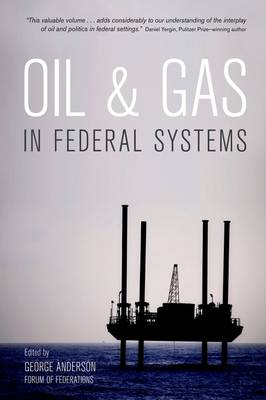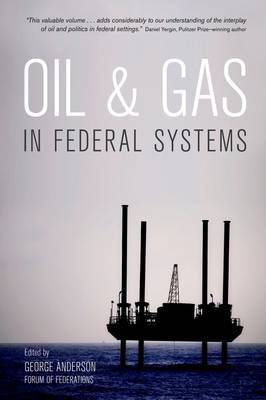
Door een staking bij bpost kan je online bestelling op dit moment iets langer onderweg zijn dan voorzien. Dringend iets nodig? Onze winkels ontvangen jou met open armen!
- Afhalen na 1 uur in een winkel met voorraad
- Gratis thuislevering in België vanaf € 30
- Ruim aanbod met 7 miljoen producten
Door een staking bij bpost kan je online bestelling op dit moment iets langer onderweg zijn dan voorzien. Dringend iets nodig? Onze winkels ontvangen jou met open armen!
- Afhalen na 1 uur in een winkel met voorraad
- Gratis thuislevering in België vanaf € 30
- Ruim aanbod met 7 miljoen producten
Zoeken
Omschrijving
As George Anderson writes in the introduction to this groundbreaking volume, "Federalism and petroleum resources can be a volatile mixture." The world's federal countries account for roughly half of the world's total annual production of oil and natural gas, which stand alone among natural resources in their economic and political impact. How such federations as Brazil, Canada, Russia, and Venezuela-among others-manage both the benefits and challenges of possessing large reserves of oil and gas will play an enormous part in determining how the twenty-first century unfolds. Oil and Gas in Federal Systems, the first book-length work of its kind, draws on the contributions of twenty-four respected scholars in the areas of petroleum policy and federal systems, examining in detail oil and gas management and revenue regimes in a dozen key federations: Argentina, Australia, Brazil, Canada, India, Malaysia, Mexico, Nigeria, Pakistan, Russia, the United States, and Venezuela. The history and development of each country's oil and gas industry is placed within the broader context of that nation's overall economic and political development. The overall result is a unique examination of the economic and political consequences of the world's reliance on fossil fuels that, as the century progresses, are likely to be in increasing demand-and ever shorter supply.
Specificaties
Betrokkenen
- Auteur(s):
- Uitgeverij:
Inhoud
- Aantal bladzijden:
- 416
- Taal:
- Engels
Eigenschappen
- Productcode (EAN):
- 9780195447323
- Verschijningsdatum:
- 5/07/2012
- Uitvoering:
- Paperback
- Formaat:
- Trade paperback (VS)
- Afmetingen:
- 152 mm x 226 mm
- Gewicht:
- 498 g

Alleen bij Standaard Boekhandel
+ 139 punten op je klantenkaart van Standaard Boekhandel
Beoordelingen
We publiceren alleen reviews die voldoen aan de voorwaarden voor reviews. Bekijk onze voorwaarden voor reviews.











